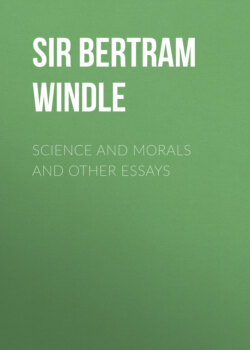Science and Morals and Other Essays

Реклама. ООО «ЛитРес», ИНН: 7719571260.
Оглавление
Sir Bertram Coghill Alan Windle. Science and Morals and Other Essays
Science and Morals and Other Essays
Table of Contents
SCIENCE AND MORALS
SCIENCE AND MORALS
§ 1. THE GOSPEL OF SCIENCE
§ 2. SCIENCE AS A RULE OF LIFE
FOOTNOTES:
II. THEOPHOBIA AND NEMESIS
§ 1. THEOPHOBIA: ITS CAUSE
§ 2. THEOPHOBIA: ITS NEMESIS
FOOTNOTES:
III. WITHIN AND WITHOUT THE SYSTEM
IV. SCIENCE IN "BONDAGE"
FOOTNOTES:
V. SCIENCE AND THE WAR
FOOTNOTES:
VI. HEREDITY AND "ARRANGEMENT"
FOOTNOTES:
VII. "SPECIAL CREATION"
FOOTNOTES:
VIII. CATHOLIC WRITERS AND SPONTANEOUS GENERATION
IX. A THEORY OF LIFE[36]
FOOTNOTES:
INDEX OF NAMES
GENERAL INDEX
Отрывок из книги
Sir Bertram Coghill Alan Windle
Published by Good Press, 2019
.....
Thus wrote Clough; but our author, it appears, would go further than this. "The preservation of an infant so gravely diseased that it can never be happy or come to any good is something very like wanton cruelty. In private life few men defend such interference" (S. 10). And so such unfortunates should be got rid of, and will be "as soon as scientific knowledge becomes common property"—when "views more reasonable, and, I may add, more humane are likely to prevail." Lest we should be depressed by this massacre of the innocents, we are told that "man is just beginning to know himself for what he is—a rather long-lived animal, with great powers of enjoyment if he does not deliberately forgo them" (S., p. 9). In the past, poor fool that he has been, he has not availed himself of his opportunities: "Hitherto superstition and mythical ideas of sin have predominantly controlled these powers." Let us, however, take heart: "Mysticism will not die out; for those strange fancies knowledge is no cure; but their forms may change, and mysticism as a force for the suppression of joy is happily losing its hold on the modern world" (ib., ib.). Let us eat and drink—and, it may be added, sin—for to-morrow we die. Such is the new gospel of science, an old enough gospel, tried and found wanting years before its latest prophet arose to proclaim it to the world. Surely no more ridiculous utterance ever was made; for its author evidently did not pause to consider that the sins which make life pleasant to some (for example, Thuggery) are apt to have quite another aspect to those through whose victimisation the pleasure is obtained. There is also here such a thing as the conscience, which has to be taken into account. Even the biological hedonist must originally possess such a thing and, it may be supposed, must deal with it as he would with the gravely diseased children, and as something which would "predominantly control his powers of enjoyment."
Seriously, it may be doubted if a more pagan code of morals has ever been laid down, and this in the Encyclical of Science for the year, a code bad enough to make poor Mendel turn in his grave could he—good, honest man—be aware of it, and imagine that he was in any way responsible for it, which, by the way, is in no way the case.
.....